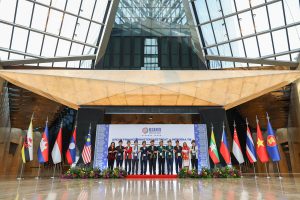The Association of Southeast Asian Nations (ASEAN) has expressed its concern about the punitive U.S. tariffs announced last week, but says that it will seek dialogue rather than retaliating against the American move.
The 10-nation bloc, which was hit particularly hard by the “reciprocal” tariffs announced by Trump on April 2 – underlined its commitment to pursue a “frank and constructive dialogue with the U.S. to address trade-related concerns.”
“Open communication and collaboration will be crucial to ensuring a balanced and sustainable relationship,” it said in a joint statement following a special meeting of ASEAN economics ministers yesterday. “In that spirit, ASEAN commits to not impose any retaliatory measures in response to the U.S. tariffs.”
However, the joint statement also said that ASEAN was “deeply concerned” about the Trump tariffs, which imposed tariff rates ranging from 49 percent on Cambodia and 46 percent on Vietnam to 10 percent on Singapore and Timor-Leste.
While the Trump administration has since announced a 90-day postponement in the reciprocal tariffs, excepting the astronomical tariffs on China, ASEAN’s economics ministers said that Trump’s dramatic moves had sent a shock of uncertainty through the international trading system.
“The unprecedented imposition of tariffs by the U.S. will disrupt regional and global trade and investment flows” and impact millions of people both in Southeast Asia and in the United States, it stated.
The statement also reaffirmed ASEAN’s support for a “predictable, transparent, free, fair, inclusive, sustainable, and rules-based multilateral trading system with the World Trade Organization at its core.”
Yesterday’s meeting took place after Malaysian Prime Minister Anwar Ibrahim, the current chair of ASEAN, urged the bloc to coordinate a unified response to the U.S. tariff announcement.
Unsurprisingly, ASEAN chose the path of discussion rather than retaliation. To begin with, trade wars and confrontation are very much anathema to the “ASEAN way,” which prizes (sometimes drearily attenuated) dialogue and positive-sum economic interaction. It also reflects the fact that the region’s export-led economies are heavily dependent on the U.S. market, and fear the impacts of decoupling on the region’s ability to maintain a balance between rival geopolitical blocs.
Whether ASEAN can move beyond its joint statement and coordinate a truly collective response, let alone negotiate as a bloc with the Trump administration, remains unclear. Several of the hardest-hit nations, including Vietnam, Thailand, Indonesia, and Malaysia, have already communicated their desire for dialogue over the tariffs, and have sent or are sending delegations to Washington for this purpose. Vietnam and Cambodia have also offered to remove or significantly reduce their remaining tariffs on U.S. goods.
However, in the longer term, the tariff crisis and the threat it poses to Southeast Asia’s export-dependent economies might help reinvigorate ASEAN’s purpose. The bloc was founded during the Cold War on the principle that the newly independent nations of Southeast Asia needed to hang together, lest they hang separately. Since the end of the Cold War, the expanded bloc has often been accused (sometimes unfairly) of devolving into a feckless talk-shop that has failed to take collective action on key issues, from the South China Sea disputes to decades of human rights outrages in Myanmar.
Harder economic times may well sharpen the minds of Southeast Asian leaders and inject fresh purpose and direction into the bloc. “In a peaceful, globalized, and intertwined world, ASEAN integration is a good-to-have,” James Chai wrote this week for Channel News Asia. “But in a conflictual, protectionist, and autarkic world, it becomes a necessity.”
Whether ASEAN can succeed in fostering a regional interest that overrides national interests – or better yet, convince member states that the two are synonymous – remains to be seen. However, if an existential threat to the region’s export-driven development model cannot foster a sense of regional interest, nothing can.

































